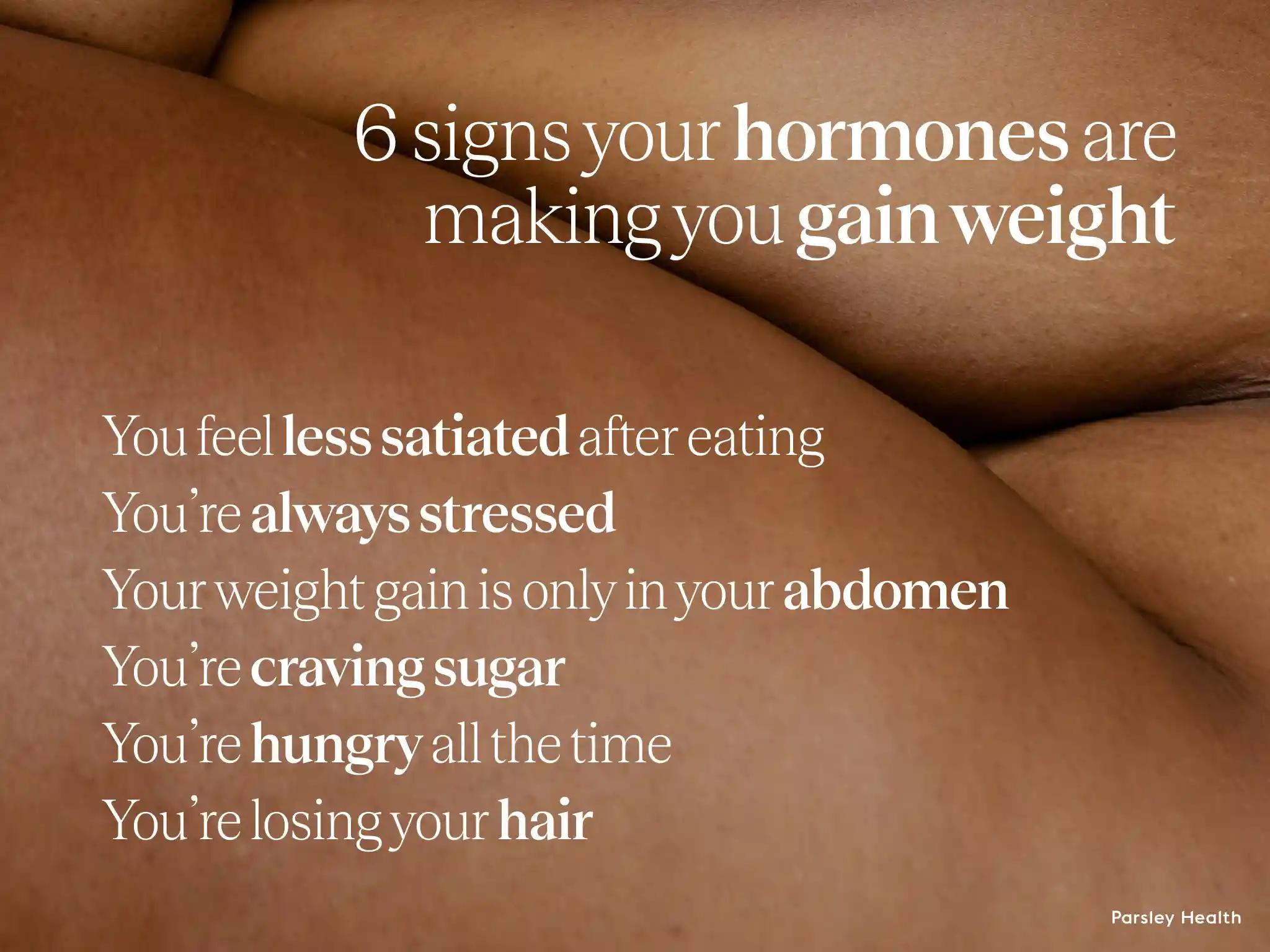This article has been medically reviewed by Nisha Chellam, MD. It contains additional reporting by Angela Myers.
Have you tried everything and are still struggling to get rid of belly bulge? It turns out your hormones may be the answer. Find out why a hormonal dysfunction can cause you to hold onto fat in unexpected places and how to get rid of hormone belly today.
Hormonal Belly: Gender-Specific Causes and Management
Unexplained weight gain can be frustrating, especially when you feel like you’re doing all the right things. Sometimes, though, a sudden belly bulge or stubborn abdominal weight you can’t seem to lose is a sign of something deeper going on with your hormones. Your hormones actually play a big part in regulating metabolism, hunger, fullness, and energy. And because your hormones are always talking to each other, they form a tangled web of communication to keep your body regulated.
A number of hormone-related conditions can cause abdominal weight gain including an underactive thyroid or polycystic ovary syndrome (PCOS). For those going through menopause—which is not a medical condition, but a natural state of endocrine reorganization that happens to every woman—weight gain can be a symptom.
Those who identify as men may also experience weight gain around the belly due to low testosterone levels. A 2024 study found a negative correlation between testosterone and body fat in men, though causation has yet to be established.
Outside of gender-specific conditions, general hormone dysfunctions, which can be the result of obesity, environmental triggers and toxins, chronic stress, or medications, may also be at the root of your resistant hormonal belly fat. If you think you’re dealing with a hormonal belly, here are a few signs to look for.
6 signs your hormones are making you gain weight and how to get rid of hormonal belly

You feel less satiated after eating
If a meal that used to fill you up now suddenly leaves you wanting more, it could be a signal that your sex hormones are indirectly impacting your main metabolism-regulating hormones. Estrogen and testosterone are the two main players here.
If you have lower than normal levels of estrogen circulating, you might find yourself not feeling as satisfied after a meal. This is because of the impact estrogen has on leptin, your satiety hormone. Leptin is released by circulating fat tissue and tells your brain that you’ve had enough to eat. The more leptin you have circulating in your system, the more satiated you’ll feel (and less compelled you’ll be to grab that second or third bowl of popcorn.)
“That’s one reason why most postmenopausal women, whose estrogen levels are lower, typically gain fat mass and lose lean mass,” says Ruvini Wijetilaka, MD, a physician at Parsley Health New York.
Testosterone, the main sex hormone found in men, has also been shown to have an inverse effect on leptin concentration. This means that as testosterone levels increase, leptin decreases. Elevated testosterone in women, due to everything from regularly missed periods, PCOS, or chronic stress, can cause a steep uptick in hunger and subsequent weight gain.
Your gameplan:
If you’re experiencing hormonal belly and have low estrogen, flax seeds, cruciferous veggies, and fermented foods should be on your plate. “Flax seeds are rich in lignans, a group of chemical compounds that functions as phytoestrogens,” explains Kelly Candella, RD, a health coach at Parsley Health New York. “Cruciferous vegetables like brussels sprouts, kale, collards, broccoli, and cabbage also contain DIM (Di-Indolyl Methane), a compound that helps the body process estrogen.”
Candella also recommends fermented foods to support a set of gut bacteria (called the estrobolome) that is specific to estrogen and produces an essential enzyme that helps metabolize estrogen. Good news is these estrogen balancing foods can also have a positive effect on lowering testosterone, helping downstream to increase your leptin levels and decrease your appetite.
You’re always stressed
When you’re stressed, your adrenal glands produce cortisol to help your body respond appropriately. A sudden boost of cortisol can be helpful in fight or flight-like situations when your body needs to act fast. But if you’re under constant stress, your adrenals don’t realize they’re releasing way more cortisol than you’d ever need, and this is not a healthy state to constantly live in. “It increases heart rate, blood pressure, and blood sugar,” says Dr. Wijetilaka. And as research shows, high levels of cortisol are highly correlated with increased abdominal fat.
Your gameplan:
There’s no question that a relationship between stress and weight gain exists, but there’s no reason to let stress be the norm for your body. Dr. Wijetilaka shares, “It’s not uncommon that I have some patients who go away on vacation and actually lose weight because they’re less stressed. And when they return, they see their weight come back.”
By adopting a daily meditation practice, you can find calm and better manage life stressors even when you’re not out of town. Research shows regular meditation dramatically lowers cortisol levels in the blood, reducing stress and inflammation, while increasing weight loss.
Your weight gain is only in your abdomen
Menopause puts your body through a whole host of changes, one of them commonly being weight gain. Why? Your production of estrogen, along with other hormones, takes a dip. Outside of menopause, low estrogen levels can be due to excessive exercise, disordered eating patterns, or pituitary gland issues. Decreased estrogen levels can change the fat distribution of your body, causing you to gain more in the belly as opposed to the hips, thighs, and buttocks.
Estrogen deficiency can also impair the action of insulin, making it harder to regulate blood sugar and leading to increased hormonal belly fat and abdominal weight gain.
Your gameplan:
Melt away hormonal belly fat caused by low estrogen and insulin resistance by adopting a low carbohydrate eating plan, recommends Candella. “Between protein, fat and carbohydrates, carbs have the biggest impact on raising blood sugar and insulin levels,” she says. Reducing high-carbohydrate foods such as refined sugars, breads, cookies, crackers, and pasta and boosting less insulin-stimulating foods rich in fiber, protein, and healthy fat can have a significant impact on your waistline.
Keep in mind that if your carb consumption dips too low, it can suppress your leptin levels and interfere with leptin’s ability to regulate your reproductive hormones so it’s important to keep some whole-food based sources of complex carbohydrates in the diet such as fruit, starchy vegetables, and whole grains.
You’re craving sugar
If you find yourself constantly craving sweets, this might be a sign that your body is struggling with insulin resistance. Insulin resistance prevents your cells from properly absorbing sugar from the bloodstream—leaving your cells starved for carbs. It can also have a secondary effect on leptin, causing your body to secrete more leptin. In this case, elevated leptin levels won’t make you feel full.
Instead, consistently elevated levels of leptin, just like consistently elevated insulin levels, will make your cells resistant to the hormone’s effects. With decreased sensitivity to both insulin and leptin, these regulatory hormones aren’t able to recognize it’s time to stop eating and you’ll continue to crave sugar, adding onto your hormonal belly fat.
Your gameplan:
One way to increase your leptin sensitivity (AKA how well your cells respond to the presence of leptin) and help you feel fuller faster is by engaging in high-intensity interval training. “HIIT workouts increase your leptin sensitivity by increasing the number of leptin receptors on fat cells.” says Dr. Wijetilaka. Increasing your leptin sensitivity will help your body recognize when leptin is secreted and make sure it does its job to let you know when you’re full.
“I also like HIIT workouts because you continue to burn calories even after your workout is done,” she says. “I recommend 2-3 times a week, and not on back to back days.”
You’re hungry all the time
Labeled as the “hunger hormone,” ghrelin tells you when it’s time to eat and has a significant impact on the size of your appetite. If you were to start fasting tomorrow, skipping breakfast, lunch, and dinner, your body would take notice and as a result begin to release ghrelin, telling you to eat again. On the other hand, if you suddenly began to binge on candy, your stomach would quickly recognize this overconsumption and cut back on ghrelin secretion.
However, research shows ghrelin secretion can become dysregulated when you gain weight. In fact, obese individuals tend to have elevated circulating levels of leptin and decreased levels of ghrelin. Having elevated leptin levels, despite what you may expect, does not always mean you are more likely to stop eating. When you have consistently elevated leptin levels this can lead to dysfunction of leptin receptors which means your brain will not receive the message you’re full. This hormonal confusion throws your hunger cues out of whack and you do the opposite of what leptin is designed to do, so you continue to eat without ever receiving the signal to stop, resulting in the undesirable hormonal belly.
Your gameplan:
Sound sleep is a key factor in ensuring your ghrelin secretion is properly regulated. Sleep deprivation can increase ghrelin, making it nearly impossible to say no to food. Getting your recommended 7 to 9 hours a night of quality sleep is just one more way you can reduce your caloric intake and carb-heavy cravings. Make getting to bed easier by creating a sleep routine, so it’s something you look forward to, rather than have to do. Power down your electronics, take out a book, brew a cup of tea, and get ready for some Zzzs.
You’re losing your hair
If your increased abdominal weight gain is coinciding with an accelerated rate of hair loss, your hormones might be to blame. Specifically, thyroid hormones help to regulate your body weight as well as your hair growth so an underactive thyroid could be the culprit of hormonal belly if you’re experiencing issues with both simultaneously.
Because the relationship between metabolism, thyroid hormones, and weight is complex, the exact mechanism by which thyroid hormones cause weight changes isn’t entirely understood. The most simple explanation is that when your thyroid isn’t producing enough hormones, your metabolic rate slows down, reducing the number of calories your body burns on a daily basis, and often contributing to weight gain, particularly around your midsection.
However, it isn’t thyroid hormones alone that play a role in how much energy your body uses. Thyroid hormones work synergistically with a number of other hormones, proteins, receptors, and chemical messengers in the body making it a layered process with other downstream effects on inadequate thyroid levels such as fatigue, hair loss, constipation, and low libido.
Your gameplan:
Work with a doctor who is experienced in diagnosing thyroid issues such as our team of trained doctors, nurse practitioners, and physician assistants at Parsley Health. If working with a practitioner outside of Parsley, make sure to ask your doctor to test for a comprehensive lab panel inclusive of your TSH (Thyroid Stimulating Hormone), Free T4, Total T4, Free T3, Total T3, Reverse T3, Anti-thyroglobulin and anti-TPO antibodies, inflammatory markers, Vitamin D and other nutrient deficiencies like we do for our members experiencing similar symptoms.
If you do, in fact, have an underlying thyroid condition, optimizing your nutrition and lifestyle to help support your thyroid is essential including consuming a whole food based, anti-inflammatory diet with limited amounts of refined sugars, processed foods, and wheat products (gluten-free diets have been shown to help support clinical improvements in those with thyroid disease). Our team of health coaches at Parsley is also well equipped to support you in creating a personalized thyroid friendly diet and lifestyle plan to get you and your thyroid back into balance.
When to see your doctor
If you experience any of the above signs, it's not advisable to start treatment on your own. Instead, you should make an appointment with your doctor to discuss symptoms and develop an individualized treatment plan.
A doctor may also refer you to a dietitian or health coach who can help you stay accountable and brainstorm ways to balance hormones that work with your lifestyle.
Frequently Asked Questions
How can you get rid of hormonal belly fat?
Getting rid of belly fat often starts with your daily routine (specifically what you eat, how you cope with stress, and if you move your body). For diet, it's best to add flax seeds, cruciferous veggies, and fermented foods to your plate—and to avoid processed carbs whenever possible. Adding HIIT workouts and meditation to your daily routine can also help balance hormones.
What are the signs of a hormonal belly?
Common signs of hormonal belly include craving sugar, never feeling satiated after a meal, and being hungry all the time. Living with constant stress is another sign a hormonal dysfunction may be the culprit. However, the most clear sign is when weight gain or stubborn fat is concentrated around the belly.
What does a cortisol belly look like?
A cortisol belly often looks more saggy than weight gain due to other reasons. It also tends to be concentrated in the waist, though it can sometimes affect the face. The only way to know if cortisol is responsible for belly fat, however, is to get a diagnosis from a doctor.

How can I lose hormonal weight?
The first step is getting the right testing done so you know which hormones are dysfunctional. After, a healthcare provider can help you create a treatment plan. Most likely, that plan will involve changes to your diet, exercise routine, and how you deal with stress. Adding meditation to your morning routine, HIIT workouts a few times a week, and flax seeds and cruciferous veggies to your plate can help you lose hormonal weight.
Key Takeaways
Hormone belly comes from many causes, including a dysfunction in estrogen, testosterone or cortisol levels.
Common signs of hormone belly include gaining weight around the abdomen, living with constant stress, craving sugar, always being hungry, and never being satiated after meals.
If experiencing hormone belly, changes to your diet, exercise routine, and how you deal with stress are often the most effective treatment. For maximum effectiveness, a doctor or health coach can help you get your hormones back to optimal functioning status.

